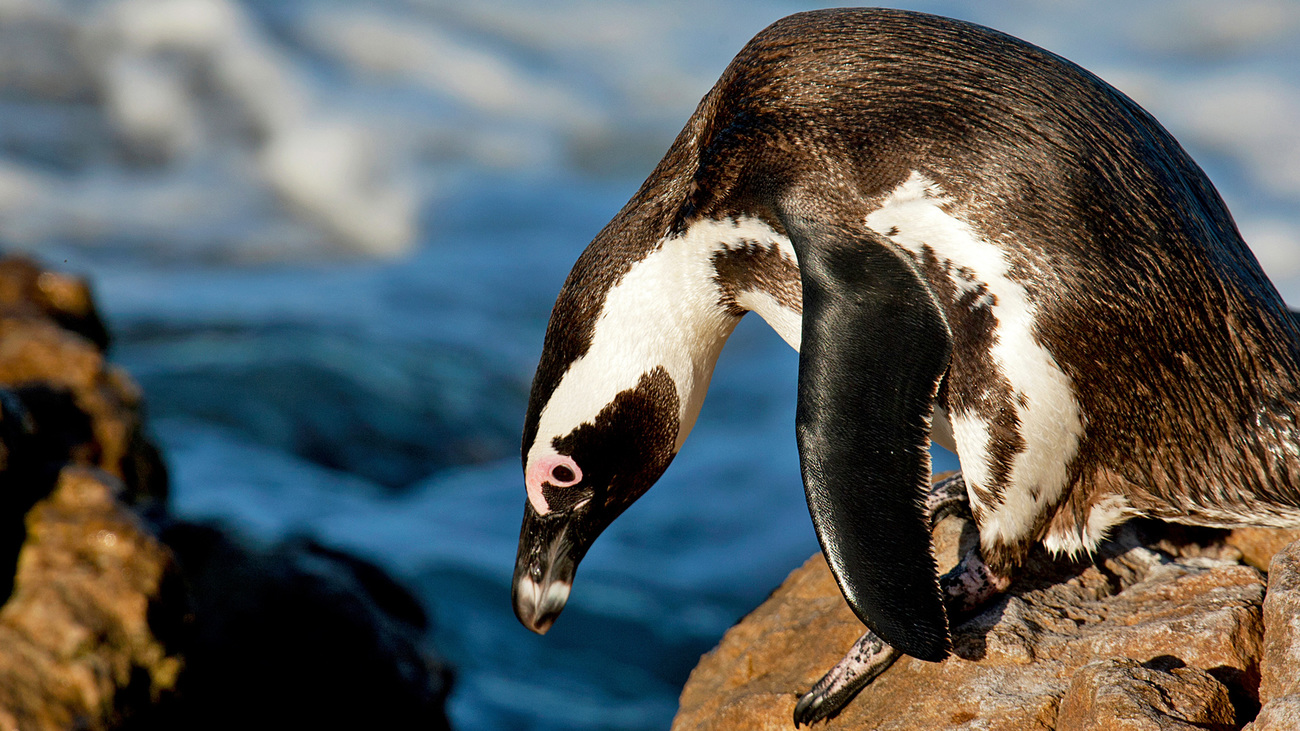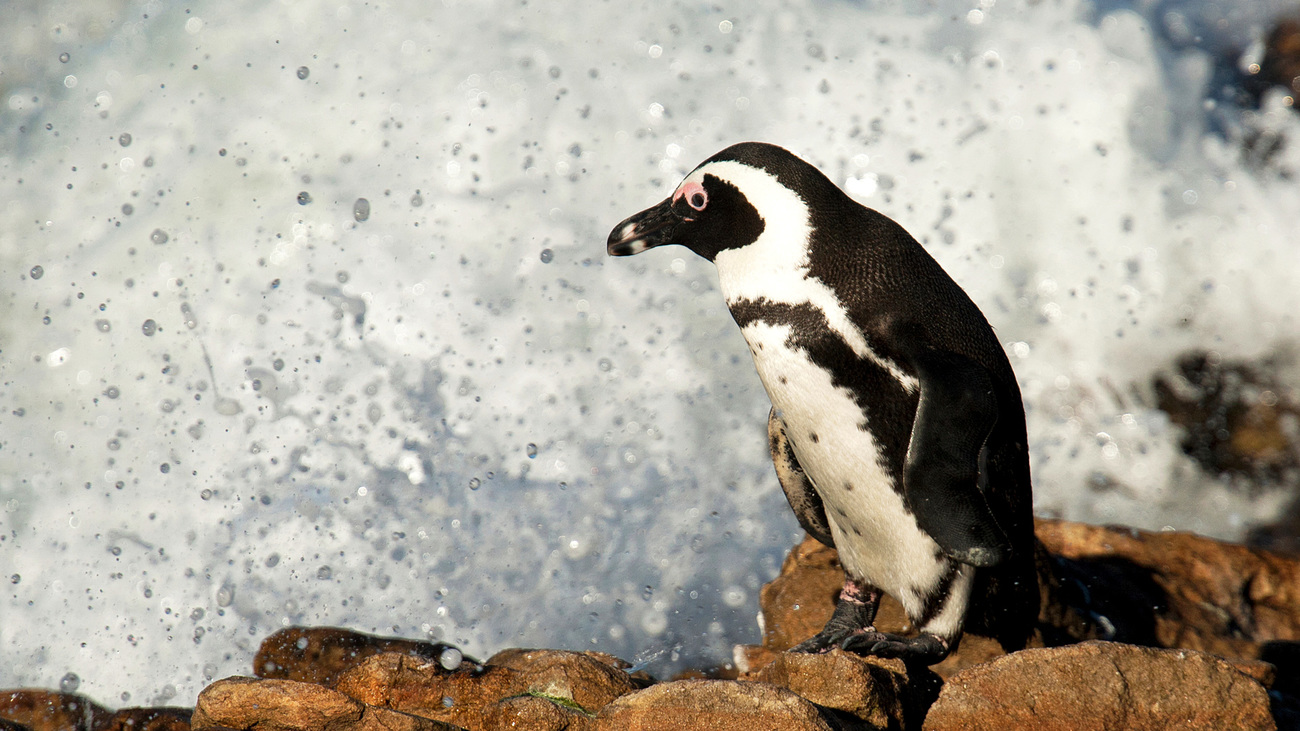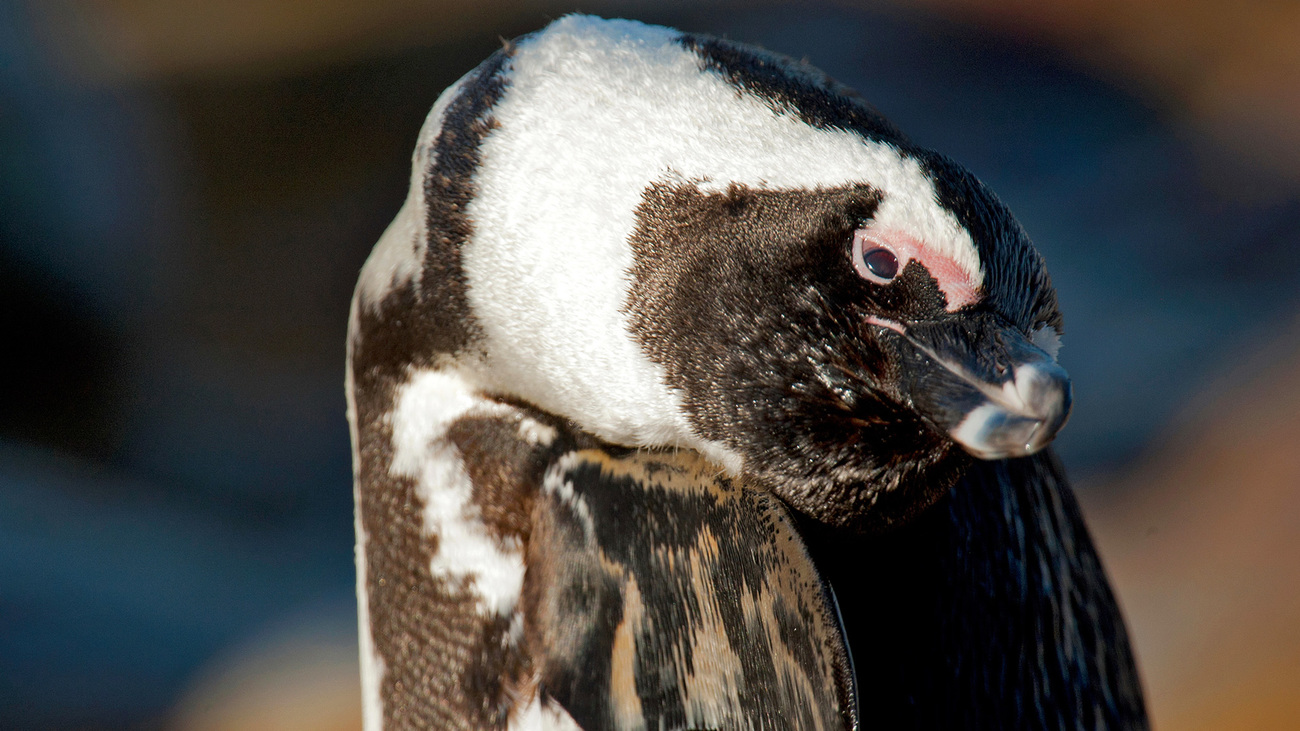The plight of the African penguin
The plight of the African penguin
African penguins, known for their endearing waddle and striking black-and-white plumage, are facing an alarming population decline. The International Union for Conservation of Nature (IUCN) recently reclassified them as critically endangered at COP16, marking a sobering point in the species’ fight for survival. This significant change in conservation status underscores the urgent need for action.

Found along the coasts of Namibia and South Africa, African penguins (Spheniscus demersus) are small, flightless birds, standing just 60 to 68 centimetres (24 to 27 inches) tall and weighing up to four kilograms (nine pounds). In addition to their small stature, these penguins are recognised by their black-and white-feathers,distinctive chest stripe, and pink, featherless skin surrounding each eye.
Sadly, the African penguin population has plummeted by an astounding 97%, declining by about 8% each year. Today, fewer than 19,800 mature individuals remain, with only 9,900 breeding pairs. Without immediate intervention, these seabirds could vanish from the ocean forever.
Threats facing African penguins
The rapid decline of African penguins is rooted in a combination of human activities and environmental changes, including food shortages caused by commercial fishing, climate change, and oil spills.
Food shortages
African penguins are specialist feeders, relying on small pelagic fish like anchovies and sardines. However, commercial fisheries often target these same species, creating direct competition between African penguins and humans for resources. As fishing depletes these fish stocks, penguins struggle to find enough food.
Climate change also plays a role in these food shortages, with rising water temperatures and shifts in ocean currents causing these fish to move away from the African penguin’s natural habitat. With this reduced access to food, African penguins face starvation, reduced breeding success, and lower chick survival rates.
Climate change
Not only has climate change reduced food availability for African penguins, but it also brings other detrimental effects. For instance, severe storms and coastal flooding can damage nesting sites, making it harder for penguins to breed and ensure the survival of their young.
Oil spills
Chronic oil pollution in the ocean and large individual oil spills are incredibly harmful to African penguins, especially as most of their population lives close to major shipping ports. When exposed to oil spills, oil coats the penguins’ feathers, compromising their insulation and buoyancy. This makes them unable to hunt for prey effectively and reduces their chances of successful breeding.
Just two oil spills, in 1994 and 2000, were responsible for the deaths of 30,000 individual African penguins. Only thanks to a massive rescue and rehabilitation project were about 40,000 other penguins saved, likely preventing the species’ extinction. Until 2021, there were a total of 71 oil spills along the coast of Namibia and South Africa, affecting 83,224 seabirds—91% of which were African penguins.
Other human activities
While overfishing and oil spills are, of course, a type of human activity, there are even more human activities that harm the African penguin population. Humans used to harvest guano—accumulated bird droppings—into which African penguins would dig their nests. This practice deprived the penguins of nesting sites, causing them to nest in open spaces and making them more vulnerable to predators. Humans also used to collect African penguin eggs, which is now an illegal practice thanks to conservation laws.

How many African penguins are left in the wild?
There are fewer than 19,800 mature African penguins left in the world, with approximately 9,900 breeding pairs. This is a sharp decline from their historic population levels.
To put it into perspective, there were an estimated 141,000 breeding pairs in 1956, 69,000 pairs in 1979, 57,000 pairs in 2004, 36,000 pairs in 2006, and 17,700 pairs in 2019. Following this trend, the species could become extinct in as little as 4,000 days (around 10 years).
African penguins live in large groups known as colonies, which offer them safety and warmth. For survival, they rely on cooperative behaviours within their breeding pairs, such as taking turns incubating eggs and protecting chicks while the other goes out to hunt for food. Once the chicks are old enough, they huddle together in groups to shield themselves against predators and harsh weather conditions.
What’s being done to protect African penguins?
IFAW has been a champion for African penguin conservation for over two decades, working to address the root cause of their decline and secure a future for the species.
IFAW has a long-standing partnership with SANCCOB (Southern African Foundation for the Conservation of Coastal Birds), based in Cape Town, South Africa. SANCCOB has been working with the local government and the small pelagic fishing industry to find solutions for African penguins to find enough food—which is critical for survival and successful breeding.
Since the year 2000, IFAW and SANCCOB have collaborated on major rescue missions, including the aftermath of oil spills, mass seabird abandonments, and other disasters. One of the most notable achievements of our partnership was the response to the Treasure oil spill in Cape Town in 2000, caused by the sinking of a cargo ship. This disaster saw the world’s largest animal rescue operation, which rescued and saved around 40,000 African penguins. Without this effort, it’s thought that the species would have been extinct by 2010.
This intense rescue mission involved devoting 30 minutes of care to each individual bird—during which rescuers used a toothbrush to clean oil out of their feathers. This was only possible thanks to the dedication of more than 45,000 volunteers and more than 130 experts, who came from around the world to help these penguins in Cape Town.

To address the serious issue of overfishing, SANCCOB has teamed up with BirdLife South Africa, taking legal action to enforce greater protection of the African penguin. With support from the Biodiversity Law Centre, these organisations have filed a case against the office of the South African Minister of Forestry, Fisheries and the Environment. They are challenging the Minister’s current policy on island closures to purse-seine fishing, calling it ‘biologically meaningless’ and insufficient to safeguard critical penguin habitats. The lawsuit advocates for replacing the existing no-take zones for commercial fishing with scientifically informed alternatives. These proposed zones, developed through an internationally recognised process, would better align with the penguins’ vital feeding grounds while reducing the economic impact on the purse-seine fishing industry.
To give African penguins the best chance at survival, IFAW will continue to work closely with SANCCOB. But even with all our tireless work, it will take more effort, requiring global support, including awareness raising. Sharing this news with your friends and family is just one way you can help support the conservation of African penguins.
Related content
Our work can’t get done without you. Please give what you can to help animals thrive.